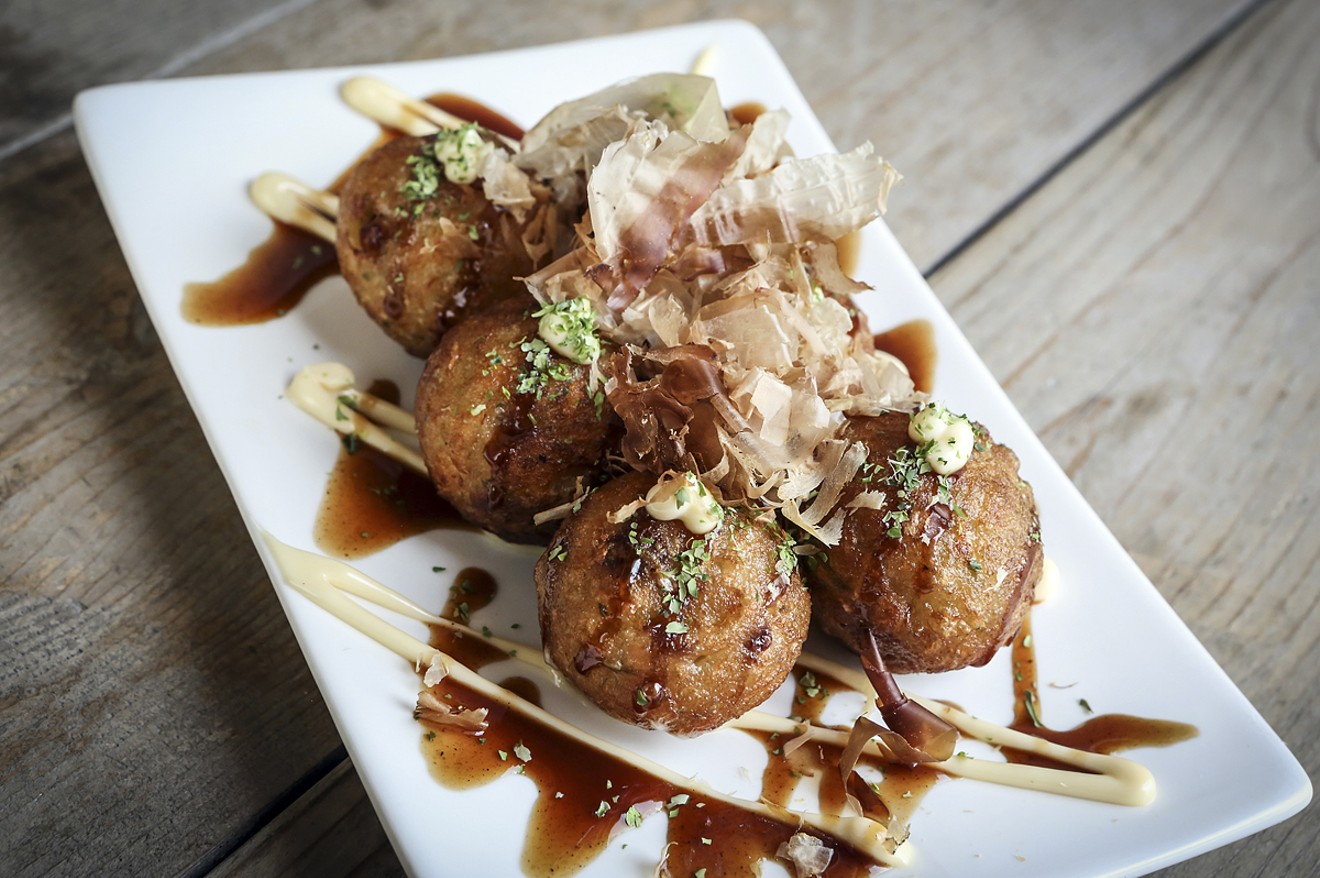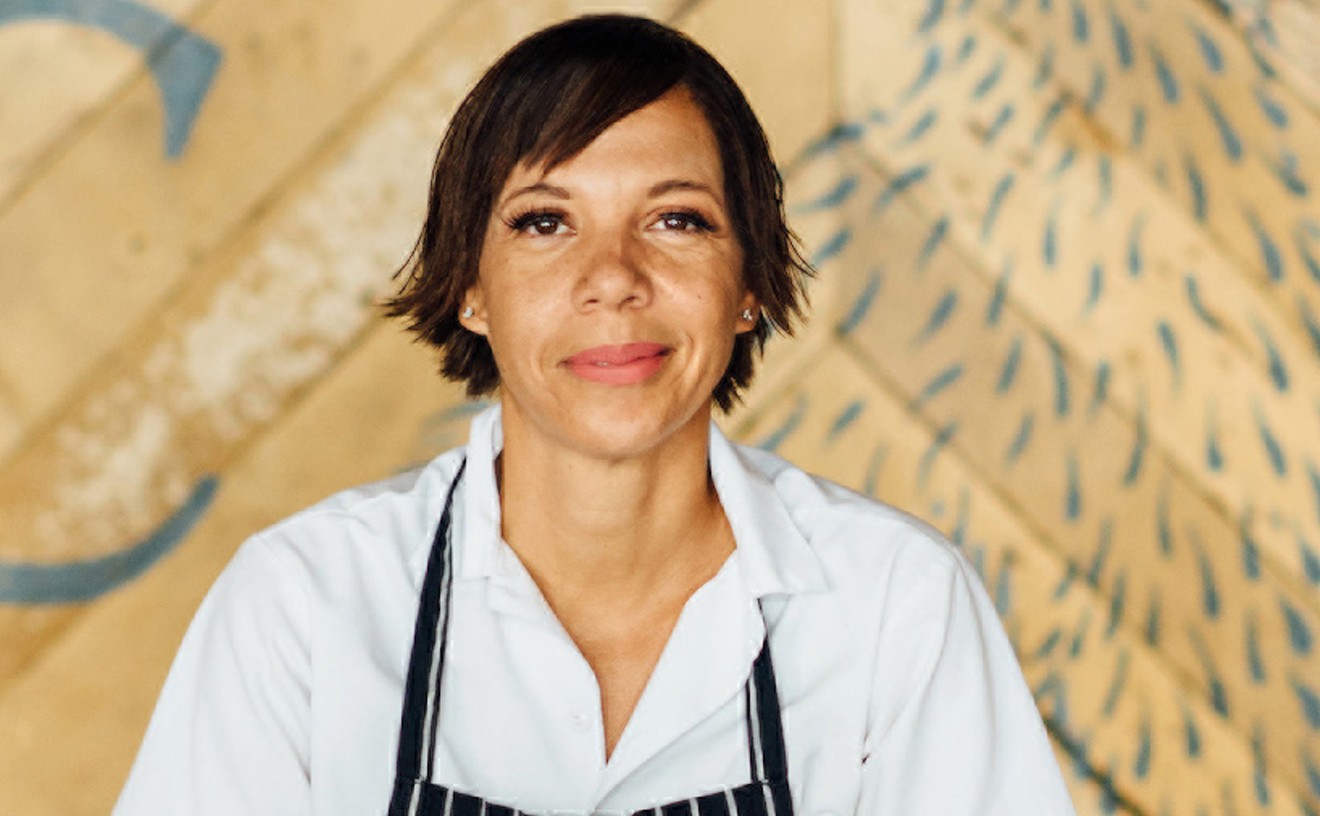Three years ago, Phuket Thongsodchareondee sent a jolt through Miami when he opened Cake Thai on Biscayne Boulevard at NE 79th Street. It's a compact place where the only decorations are magazine ads with an animated, pop-culture look covered by Thai script. The menu is packed with the intense sweetness, sourness, and spice that is the hallmark of traditional Thai cuisine. You can even get hard-to-find dishes and ingredients such as cured sausage and the flowery-tasting greens called morning glory.
So it seemed a diversion when Thongsodchareondee, nicknamed Cake, announced he would take over the space once held by the Gang Miami and open a Japanese spot called Gaijin Izakaya by Cake (3500 N. Miami Ave., Miami; 305-456-3207). The place, he said, would ply sushi, ramen, yakitori, and all sorts of fried dishes.
Cake began cooking at a young age. Growing up on the Thai island of Phuket, he would help his father, Tawin, run the family's seaside restaurant. He spent his teens bouncing between Bangkok and the island before relocating to Australia for cooking school. Afterward came harsh training in westernized Thai restaurants. In 2007, he moved to Miami, where he found work at two now-closed restaurants before ending up in the kitchen at Bal Harbour's Makoto, where his repertoire of Japanese cuisine began to coalesce.
The vast majority of the dishes at Gaijin focus on and enhance single ingredients.
tweet this
At Gaijin, which opened in early July, Cake shows himself to be nearly as adept with Japanese cuisine as he is with that of his homeland. What's more, he's flexible. Though most of his Thai dishes rely on a melding of the powerful flavors from ingredients like fish sauce, lemongrass, and palm sugar, the vast majority of those at Gaijin focus on and enhance single ingredients.

In few dishes is this more evident than yakitori. A variety of meats and vegetables are seasoned with either salt or the quasi-Japanese barbecue sauce called taré, which is a reduction of soy, sake, and chicken drippings. When and where to deploy each is at your discretion; however, the taré works wonders on skewered leeks ($4), which the hot coals crisp and sweeten. Though the temptation to double up on the chicken flavor is intense, with the chicken skin ($4), thigh ($5), and wing ($6), it's sometimes better to show restraint. Opting for shio in these cases allows the chicken to baste itself while preserving crispness. The turkey gizzard ($6) is the lone letdown. It's large and like inedible leather in some places.
The focus on single ingredients continues throughout the list of hot and cold dishes, fried plates, and entrées.
Sushi plays prominently with the wider array of options that's becoming a must for many Japanese places. There's the orange clam called aoyagi ($12), live scallop ($16), and golden eye snapper called kinme dai ($12). The cured Japanese mackerel — saba ($10) — is the most impressive. Here, the slightly oily fish is cured just long enough in rice vinegar that the acid permeates the flesh without inundating it.
Since the restaurant opened, Cake and his cooks have also toyed with giving some local species such as Florida mackerel, blackfin tuna, jackfish, and black grouper the Japanese treatment.

All of these options are a good counterbalance to an extensive hot and fried section that plies some of the most enticing yet also some of the heaviest dishes on the menu, including the okonomiyaki ($13), takoyaki ($12), ebi shiso tempura ($11), and the vegetable fritters called kakiage ($10). The first of the bunch is a regrettable miss, mostly due to the fact that the vegetable pancake bound with Japanese mountain yam is a flaccid, textureless thing that arrives lukewarm. The shredded, pickled ginger on top has a neon color and metallic taste hinting at time spent inside a jar.
Dishes arrive sizzling hot and aggressively flavored. The orbs of takoyaki crack open, revealing a rich batter studded with plenty of meaty octopus bits. The kakiage shows off the kitchen's tempura skills. Razor-thin pieces of mushroom, yam, and eggplant are encased in transparent shells without a hint of grease.
That same skill works wonders on a tender chicken cutlet that for a donburi ($12) is coated in panko breadcrumbs, crisped, sliced into strips, and then rested atop a steaming heap of sweet short grain rice crowned with an egg and sautéed onions. There is no time of day this dish wouldn't suit perfectly.

The other starch-based highlight is championed by what has been dubbed Miami ramen ($26). It's a thick, creamy miso broth spiked with shrimp fat and enough chili to give it a red hue and plenty of heat. Half of a head-on shrimp and three perfectly cooked mussels poke out of broth filled with wavy ramen noodles that need to be slurped quickly so they don't go soft. Perky enoki mushrooms, sugary corn, and preserved bamboo shoots add some earthy, sweet heft to each bite. The $20-plus price is well worth it.
Gaijin's menu is vast — more than 60 items in total. And as with Cake's other restaurants, hidden gems and signature dishes are strewn throughout. Whatever you do, be sure to leave room for a scoop of wasabi ice cream (think sweet and spicy) alongside a salty-sweet sphere of ice cream with the pickled plums called umeboshi.
Like much of what this chef does, the only thing crazier than how it sounds is how well it works.












